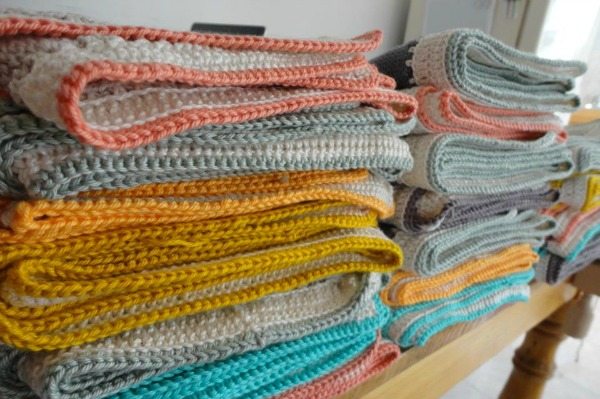By Ángel González
The Seattle Times.
CAP-HAÏTIEN, Haiti
When Resilia Verdéus’ husband died four years ago, she struggled to support her seven children as a street vendor selling water in little plastic bags. So she put her daughter Angéline, nearly 3 years old, in an orphanage.
Now Verdéus works in an apartment with 11 other mothers, who weave, knit and crochet for six hours a day, five days a week.
The fruit of their labor: baby blankets, which are shipped in suitcases to the United States and marketed for $72 apiece by the Seattle nonprofit Haiti Babi. They also make baby hats, which Haiti Babi sells for $23.
The moms can earn up to $10 a day, plus a transportation allowance and free lunch — an attractive deal in a country where most people live on less than $2 a day.
The money enabled Verdéus, who doesn’t know her exact age but thinks she is around 40, to reclaim her little girl last July, after four years.
“They gave her back to me,” she said, grinning. “She loves her brothers and sisters.”
Haiti Babi, the creation of a University of Washington graduate who works in real estate investment, touches two intricately related issues in Haiti.
Haiti’s orphanages house a staggering number of children — UNICEF counted 430,000 in a country of 10 million.
Strikingly, the majority have living parents or close relatives. These children were given up for adoption because the families, like Verdéus, are too poor to feed them.
So Haiti Babi’s role is to give mothers some job skills and a good salary that will make them independent.
“They just need an opportunity to earn their own money and take care of themselves,” said founder Katlin Jackson, who began volunteering in Haiti’s orphanages after finishing graduate school in 2011.
A year later, the 29-year-old started the nonprofit, which she hopes can become a self-sustaining enterprise, depending not on outsiders’ charity but on Haitian resourcefulness.
“We came up with the concept of employing moms by creating a product that we could sell in the Western market; and something that was going to make sense for them — not making iPhone covers, for example,” she said.
Right now the nonprofit itself survives thanks to a combination of donations and product revenue. Its sales are picking
up: After averaging 30 blankets per month for a long period, the nonprofit in October sold 86 blankets and 82 hats.
During an October visit the goods were packed in a used Amazon box, ready for shipment to Seattle.
The blankets are retailed at Seattle boutiques Village Maternity, Tottini and Local Color; they’re also sold on Etsy.com and have been featured at moms-oriented website zulily.
Production is done in the apartment of 26-year-old operations manager Sarah Jenks, who graduated from UW with a double major in journalism and photography, and moved to Haiti in February last year. In the Haitian Creole she’s picked up in her short time there, she battles local bureaucracy and handles logistics.
She also makes sure her employees adapt to what in most cases is their first formal job outside the home — which requires skills such as communicating well with colleagues and getting to work on time.
The moms, despite having been dealt a tough lot, manage to “rise above and come to work every day,” she says.
In a country where the dusty, busy streets are full of people hawking water, food and used clothing, what’s most surprising about the Haiti Babi workplace is the quiet. It’s only interrupted by melodic humming, or laughter prompted by an occasional joke.
For Florène Floréus, it’s been the ticket to a new life. She lives in a mountain village west of Cap-Haïtien, daily taking an hourlong ride on a “tap tap” truck to get here.
The money she makes at Haiti Babi has helped her build a house in her village, paid for school for her three daughters and two sons, and nurtured a vision of a better future for her children.
“I want my boys to go to university to become doctors and the girls to become nurses,” Floréus said.














































































































































































































































































































































































